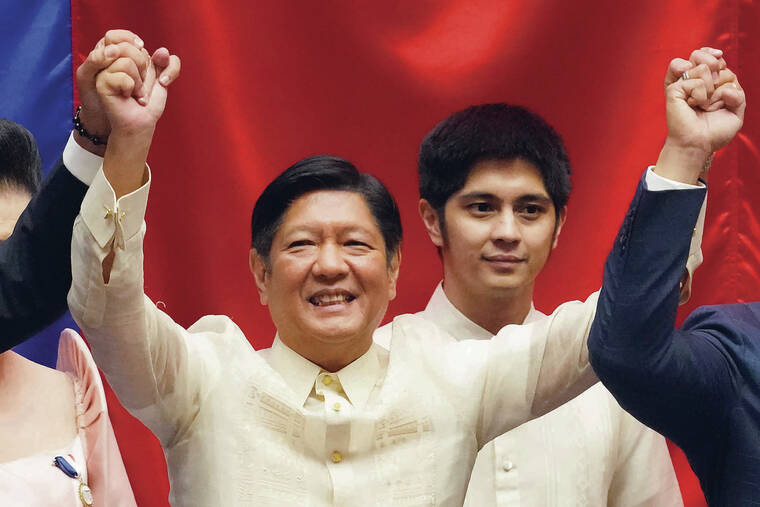Patricio Abinales was a freshman at the University of the Philippines in 1972 when then-President Ferdinand Marcos enacted martial law. He went to campus that day, before he knew that classes would be canceled for the next three months.
“The person you (saw that day was) not the lazy university security,” Abinales said, “but a marine pointing a machine gun at you and saying, ‘go home.’”
Abinales, now a University of Hawaii professor who specializes in Philippine and Southeast Asia politics, said he protested during martial law in the Philippines until Marcos fled the country in 1986. He remained there until two of his friends were assassinated within one year for speaking out against the succeeding president. Abinales moved to the U.S. in 1997.
Ferdinand “Bongbong” Marcos Jr., the dictator’s son, was proclaimed the president-elect of the Philippines last month — a development that has made Abinales question whether his time as an activist would have been better served by simply fleeing the country, or becoming a “boring” corporate office worker rather than a politics professor.
“The other side of me says, ‘no, it was worth it,’” Abinales said.
But unlike Abinales, many of Hawaii’s Filipinos strongly support the deceased dictator’s son.
Marcos Jr., who will take office Thursday, impressed Cecilia Villafuerte with his eloquent speeches promising free education for children and college students, the latter of which has already begun in the north, Villafuerte said.
Villafuerte moved from the city of Baguio to Oahu when she was 25, two years before the elder Marcos enacted martial law in the Philippines. She believes the majority of Hawaii’s Filipinos support his son because many are from Ilocos, the same region the Marcos family is from.
“Just like in Hawaii, when anybody from Hawaii does very well, either globally or nationally, we all support that,” explained Villafuerte. “So same thing in the Philippines. When somebody is from your place, the support is always there.”
Villafuerte visited Ilocos five years ago for a family reunion. Unlike the asphalt roads she usually saw in the Philippines, the streets there were clean, made of concrete and lined with flower gardens.
During her trip she also saw windmills, the Malacanang of the North and many bridges, including the San Juanico Bridge — all projects which were carried out by members of the Marcos family, Villafuerte said.
Flor Martinez, a Philippines news analyst at KNDI radio, said he admires how Marcos Jr. doesn’t engage with negativity from his opponents and instead chooses to keep his focus on bettering the Philippines.
“That kind of character alone is something that struck me,” Martinez said.
Roland Casamina, president of Hawaii’s Filipino Community Center and House of Finance, also said he believes Marcos Jr. shows a lot of promise.
So far he’s delivered on his pledge to unite Filipinos, he’s shown good sportsmanship toward
his opponents and he shouldn’t be blamed for his father’s actions, Casamina said. Since the Marcos family already has wealth, however ill-begotten by his father, many Filipinos believe Marcos Jr. will use it to help the country, he said.
“And now he’s here and he’s really showing it,” Casamina said. “So far so good.”
Even Abinales wasn’t surprised by Marcos Jr.’s election.
“If you go to his (the elder Marcos) hometown, it’s one of the two small cities in the Philippines where people stop on a red light,” Abinales said. “Because that’s how they respect the authority of the government.”
Marcos Jr. was the first to win a Philippines election by a large majority since 1969, Abinales said. Usually presidents win with 32%-40% of the votes, while Marcos Jr. won with 57%, he said.
Abinales suspects that the younger Marcos’ strong social media campaign was a big contributor to his success.
Instead of engaging in debates with opponents, the new president would be shown talking about the positive work his father had done for the Philippines, or about cooking,
or the type of father he is, Abinales said.
“He actually admitted he had a troll army that was paid a lot, I think millions
of pesos, to run a sustained campaign that would attack the other candidates,” Abinales said.
Abinales also highlighted that half of the 67 million voters in his election were between the ages of 18 and 40, and had no memory of what it was like to live under martial law with a dictator who committed human rights violations.
“Filipino historians never really sat down to write a history of the dictatorship,” Abinales said. “I think the generation that is supposed to write it is still traumatized.”
Casamina doesn’t deny that the elder Marcos hurt many people, but he doesn’t believe that the son will follow in his father’s footsteps.
“I think he really does show much promise,” Casamina said. “And so far, he’s delivered on his promise to unite the Filipinos, to see what’s best for the country and for the
Filipinos.”

